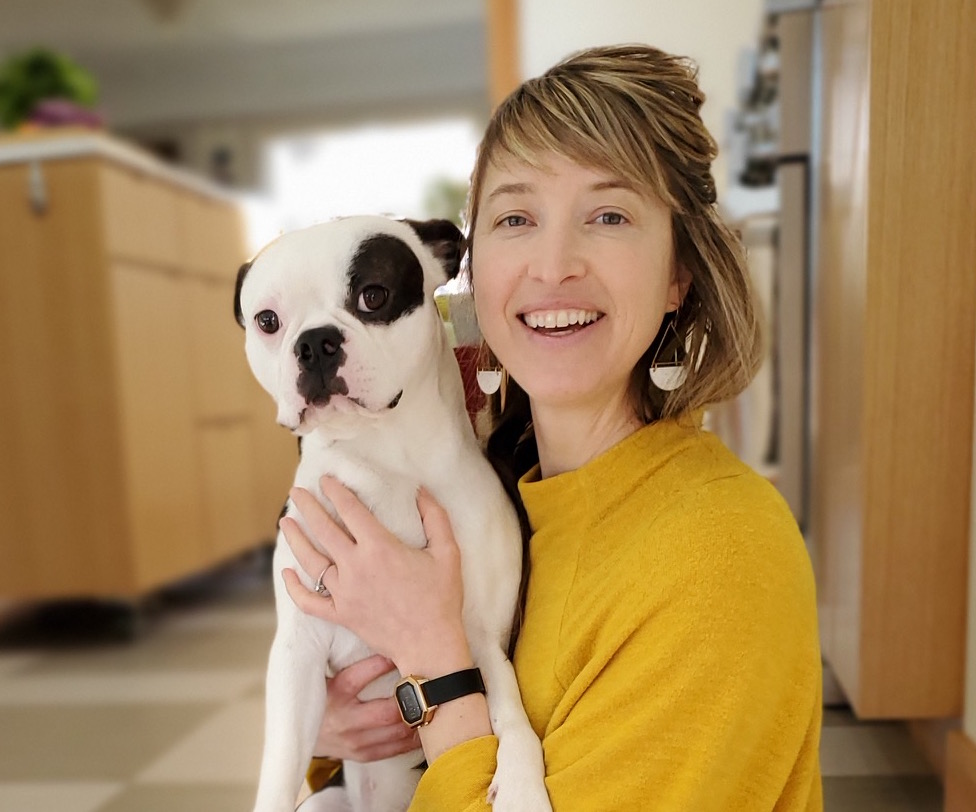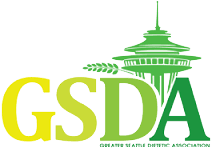RD feature- Jen Plumb

Jen is a clinical dietitian at Swedish Hospital, Cherry Hill. Her hobbies include: open water swimming, tennis, pickle ball, cooking, and reading. She’s trying to reach 52 books this year, and is currently at 40! She often commutes to work on her bicycle and has been practicing daily yoga at home for the past 5 years and finds it essential for her wellbeing. You might see her walking around the Ballard neighborhood with her cute pup Bandito! She recently started a private practice called Sustainable Nutrition. I sat down with Jen to learn a little more about her.
1. Tell me a little about your background.
I grew up in Wisconsin and was a terrible college student in my twenties. I tried lots of things but I wasn’t focused. I moved out to Washington ~20 years ago and met great people volunteering at an animal shelter. Animals have been a huge part of my life for a long time, so I became a vet tech and worked in clinics all over Olympia and Seattle for 15 years. As a vet tech “you’re the boss”, the doctors respect you because of all the responsibility. You’re giving the animals anesthesia, IVs, lab draws, etc. When I decided to transition from vet medicine to human nutrition in my late 30s; I chose Bastyr University. I was always interested in nutrition and believe it’s so much more than just food. We need to consider the whole person.
2. Why did you become and RD?
I love food, medicine, and science and knew I wanted to work clinically. I love learning new things everyday, working in the Cardiac ICU. My job feels meaningful and I enjoy collaborating with the interdisciplinary team. Clinical nutrition is endlessly fascinating, while at times, heartbreaking. In my private practice, I continue to find myself falling back on the philosophy that nutrition is not just about food but also mental health, relationships, stress, activity, sleep, etc. Food is just a portion when it comes to nutrition. My practice was born from experiences in the ICU. There is only so much you can do for someone in that setting. People need much more than acute care for chronic diseases.
3. What is something you have learned recently or that you want to learn?
I just heard this great quote about listening. Mantra: Listen to understand, not to react. This is what I am learning. Listening has always been a practice for me but I strive to be more thoughtful; to understand first, before asking the next question. When I am trying to focus on listening, it’s helpful for me to tuck my chin and lean in, maybe even break eye contact. When i’m ready to speak, I lift my chin and make eye contact again. I also want to learn better swimming techniques for open water! I like to be in the water as much as possible!
4. What do you feel is an important focus for the future of dietetics?
Focusing more on behavior change than education. Sometimes the dietetics field is too education heavy. We need to focus more on the “how” than the “why”. “Why” comes after the “how”. One of the things I feel strongly about and want to focus on in private practice is to guide people through behavior changes. People know what to do but need help cracking the code. I recently completed a professional coursework called “Tiny Habits” by BJ Fog. It’s about utilizing awareness of daily routine and using existing habits as a prompt for developing new habits. Removing barriers is crucial, so forming new habits is as easy as possible. It’s best to make changes based on tiny successes that lead to more, until you can see yourself succeeding. People always choose high milestones. We underestimate what we can do over time with small changes. I want to encourage people to buy into tiny habits. Nutrition is just a piece of the puzzle. Mental health, sleep, relationships, movement, social life, etc have such a huge impact on eating habits and need to be part of the intervention. The word of the year for me is connection. Bonding with people on personal levels is what makes the difference. Connecting with other human beings is how we get through all of this.
5. If you could make dinner with your idol, who would it be and what would you make?
My mom. She died when I was twelve and I didn’t get into cooking until my twenties. I never got a chance to learn about food from her. I would give anything to go back and cook one of her favorite recipes together. I’m reading “Crying in H Mart” right now. This memoir details the complicated relationship this woman had with her mother, whom she loses to pancreatic cancer. It’s about Korean culture and is so beautiful and interesting.
